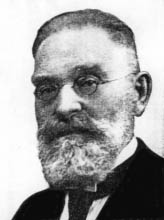Gustav Gärtner on:
[Wikipedia]
[Google]
[Amazon]
Gustav Gärtner (September 28, 1855 – November 4, 1937) was an Austrian  In 1879 he earned his doctorate from the
In 1879 he earned his doctorate from the A brief history of cocaine
by Steven B. Karch Gärtner is credited with the creation of a number of medical devices and apparati; one of his better known inventions being a
''Gustav Gärtner''
@
pathologist
Pathology is the study of the causes and effects of disease or injury. The word ''pathology'' also refers to the study of disease in general, incorporating a wide range of biology research fields and medical practices. However, when used in t ...
born in Pardubice, Bohemia.
 In 1879 he earned his doctorate from the
In 1879 he earned his doctorate from the University of Vienna
The University of Vienna (german: Universität Wien) is a public research university located in Vienna, Austria. It was founded by Duke Rudolph IV in 1365 and is the oldest university in the German-speaking world. With its long and rich hist ...
, afterwards working in Vienna
en, Viennese
, iso_code = AT-9
, registration_plate = W
, postal_code_type = Postal code
, postal_code =
, timezone = CET
, utc_offset = +1
, timezone_DST ...
as an assistant to Salomon Stricker
Salomon Stricker (1 January 1834 – 2 April 1898) was an Austrian pathologist and histologist.
Career
Stricker was born in Waag-Neustadtl (Hungarian: Vágújhely, now Nové Mesto nad Váhom in Slovakia). He studied at the University of Vienna, ...
(1834-1898), and later as an associate professor (1890). In 1918 he became a "full professor" at the University of Vienna.
In Vienna he conducted scientific studies of kidney
The kidneys are two reddish-brown bean-shaped organs found in vertebrates. They are located on the left and right in the retroperitoneal space, and in adult humans are about in length. They receive blood from the paired renal arteries; blo ...
functions, experiments dealing with electrical
Electricity is the set of physical phenomena associated with the presence and motion of matter that has a property of electric charge. Electricity is related to magnetism, both being part of the phenomenon of electromagnetism, as described ...
skin resistance and research involving innervation
A nerve is an enclosed, cable-like bundle of nerve fibers (called axons) in the peripheral nervous system.
A nerve transmits electrical impulses. It is the basic unit of the peripheral nervous system. A nerve provides a common pathway for the e ...
of vessels of the brain. Also, he worked with Carl Koller (1857-1944) involving experiments on the use of cocaine
Cocaine (from , from , ultimately from Quechua: ''kúka'') is a central nervous system (CNS) stimulant mainly used recreationally for its euphoric effects. It is primarily obtained from the leaves of two Coca species native to South Ameri ...
as an anaesthetic
An anesthetic (American English) or anaesthetic (British English; see spelling differences) is a drug used to induce anesthesia — in other words, to result in a temporary loss of sensation or awareness. They may be divided into two ...
in eye surgery.by Steven B. Karch Gärtner is credited with the creation of a number of medical devices and apparati; one of his better known inventions being a
tonometer
Tonometry is the procedure eye care professionals perform to determine the intraocular pressure (IOP), the fluid pressure inside the eye. It is an important test in the evaluation of patients at risk from glaucoma. Most tonometers are calibrate ...
that contained an inflatable finger cuff for measurement of blood pressure. He developed the eryostat, an electric machine to support adipositas therapy.
He also made contributions in the study of nutrition
Nutrition is the biochemical and physiological process by which an organism uses food to support its life. It provides organisms with nutrients, which can be metabolized to create energy and chemical structures. Failure to obtain sufficient ...
, mainly in the field of dietetics
A dietitian, medical dietitian, or dietician is an expert in identifying and treating disease-related malnutrition and in conducting medical nutrition therapy, for example designing an enteral tube feeding regimen or mitigating the effects of ...
. The principles of the "Gaertner diet" were propagated in his book ''Diätetische Entfettungskuren''.
Written Works
* ''Ueber die therapeutische Verwendung der Muskelarbeit und einen neuen Apparat zu ihrer Dosirung'', Wien, Im Selbstverlag des Verfassers, 1887. Offprint from Allgemeine Wiener medizinische Zeitung, 1887. * ''Über den Hirnkreislauf''. Vorläufige Mitteilung. 1887. By Julius Wagner-Jauregg (1857-1940) and Gustav Gärtner * ''Ueber den elektrischen Widerstand des menschlichen Körpers gegenüber Inductions-strömen'', Wien, A. Hölder, 1889. 529 pages. * ''Ueber einen neuen Blutdruckmesser'' (Tonometer). Vortrag, gehalten am 16. Juni 1899 in der k.k. Gesellschaft der Aerzte in Wien, von Gustav Gartner. Wien, M. Perles, 1899. Offprint from Wiener Medicinische Wochenschrift, 1899, 49, No. 30. * ''Ueber einen neuen Apparat zur Bestimmung des Hämoglobingehaltes im Blute'', München, J. F. Lehmann, 1901. 14 pages. Offprint from Münchener medicinische Wochenschrift, 1901, No. 50. * ''Diätetische Entfettungskuren''. Leipzig 1913. Translated into English.References
''Gustav Gärtner''
@
Who Named It
''Whonamedit?'' is an online English-language dictionary of medical eponyms and the people associated with their identification. Though it is a dictionary, many eponyms and persons are presented in extensive articles with comprehensive bibliograp ...
{{DEFAULTSORT:Gartner, Gustav
1855 births
1937 deaths
People from Pardubice
Academic staff of the University of Vienna
Austrian pathologists